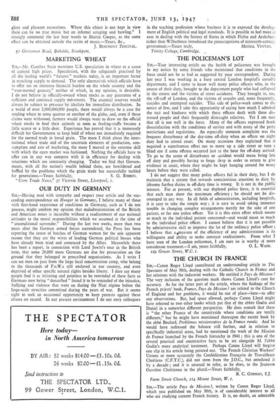MARKETING WHEAT
SIR,—Mr. Gunther Stein mentions U.S. speculation in wheat as a cause of current high prices. Speculation, with the safeguards practised by all the leading world's " futures " markets today, is an important factor in matching supply to demand. The only alternatives which officials have to offer are an immense financial burden on the whole country and the " ever-normal granary," neither of which, in my opinion, is desirable. I do not believe in officially-owned wheat stocks as any guarantee of a sufficient and continual supply movement. The essential reserves would always be subject to pressure by idealists for immediate distribution. In a world of over 2,000,000,000 people, there would always be a case for sending wheat to some quarter or another of the globe, and, even if these claims were withstood, farmers would always want to draw on the official wheat stocks to feed their animals as soon as feeding-stuffs became a little scarce or a little .dear. Experience has proved that it is immensely difficult for Governments to keep hold of wheat not immediately required for the normal trade in bread grain. The more I think about the inter- national wheat trade and of the uncertain elements of production, con- sumption and rate of marketing, the more I marvel at the extreme skill with which the open market was fashioned. Nothing the officials have to offer can in any way compete with it in efficiency for dealing with situations which are constantly changing. Today we find that Govern- ments, with all the nation's wealth behind them, are bewildered and baffled by the problems which the grain trade has successfully tackled


































 Previous page
Previous page